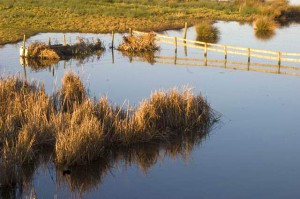Ditch new dredging proposals, says WWT

 Proposals to give farmers a greater licence to dredge watercourses on their land could increase flooding downstream and damage wildlife, says WWT.
Proposals to give farmers a greater licence to dredge watercourses on their land could increase flooding downstream and damage wildlife, says WWT.
Dredging can, in many circumstances, enable rainwater to be carried away more rapidly. Currently the Environment Agency oversees which watercourses are dredged so that the faster moving water doesn’t create a bottleneck downstream and cause towns or land many miles away to become flooded, or harm wildlife.
While landowners can already undertake some dredging, some farmers are left with undredged larger watercourses on their land which could potentially cause flooding, resulting in possible economic losses. So the Government has suggested giving farmers greater licence to decide and carry out where dredging happens.
WWT Head of Conservation Policy Carrie Hume says:
"A balance needs to be reached. While it’s important for all of us that farmers can produce food and raw materials, an uncoordinated and less informed approach to dredging risks increasing the flooding further downstream – which could cause more damage to farming than it solves.
"Poorly executed dredging can be destructive to wildlife as it involves scraping away the waterway bed and sometimes its banks, which removes plant life, kills invertebrates and wipes away food and homes for mammals and amphibians.
"The fact that watercourses are silting up suggests land owners are experiencing problems restricting runoff from their fields. It would be much more sensible, effective and cheaper to focus on ways to reduce the need for dredging in the first place. For example, planting reed beds along a watercourses will capture much of the silt and pollution running into it."
The Government’s proposals appear to be at odds with its ‘Catchment Based Approach’ commitment, announced in June, to improve the health of our rivers through co-ordinated action which looks at each river holistically in terms of its entire catchment. There is also the risk of legal action as one piece of piecemeal dredging causes effects on land owners further along the watercourse, and there may be less than rigorous adherence to other environmental legislation designed to protect wildlife.
The Blueprint For Water coalition of environmental organisations, which includes WWT, is calling on the Government to shelve the proposals, and instead look at greater support for farmers in adopting better soil and land management practices which reduce flood risks on agricultural land. They are also calling on the Government to reduce the red tape which the Environment Agency has to overcome when planning dredging, so that dredging decisions can be taken quickly but still take account of environmental protection and the effects on the river catchment as a whole.